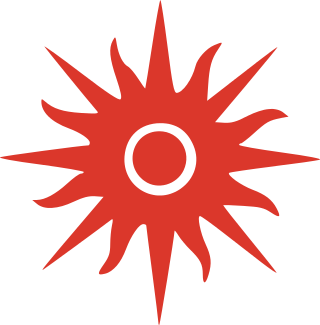
The Asian Games, also known as Asiad, is a continental multi-sport event held every fourth year among athletes from all over Asia. The Games were regulated by the Asian Games Federation (AGF) from the first Games in New Delhi, India in 1951, until the 1978 Games. Since the 1982 Games, they have been organized by the Olympic Council of Asia (OCA), after the breakup of the Asian Games Federation. The Games are recognized by the International Olympic Committee (IOC) and are described as the second largest multi-sport event after the Olympic Games.
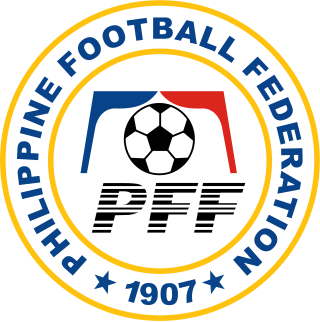
The Philippines national football team represents the Philippines in international football, governed by the Philippine Football Federation (PFF) and has been playing internationally since 1913.
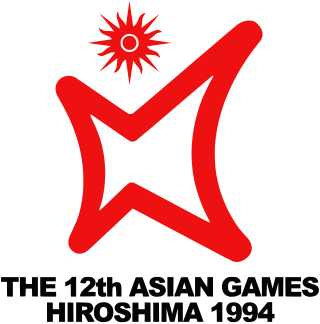
The 1994 Asian Games, also known as the XII Asiad and the 12th Asian Games, were held from October 2 to 16, 1994, in Hiroshima, Japan. The main theme of this edition was to promote peace and harmony among Asian nations. It was emphasized by the host because the venue was the site of the first atomic bomb attack 49 years earlier. Due to the 1991 Gulf War, Iraq was suspended from the games. The games debuted former republics of the Soviet Union: Kazakhstan, Kyrgyzstan, Tajikistan, Turkmenistan, and Uzbekistan.

The 2010 Asian Games, officially known as the XVI Asian Games and also known as Guangzhou 2010, were a regional multi-sport event that had taken place from November 12 to 27, 2010 in Guangzhou, Guangdong, China. It was the second time China hosted the Asian Games, with the first one being Asian Games 1990 in Beijing.

The 2014 Asian Games, officially known as the 17th Asian Games and also known as Incheon 2014, was a pan-Asian multi-sport event held in Incheon, South Korea.

The China men's national basketball team represents the People's Republic of China in international basketball tournaments. The national team is governed by the Chinese Basketball Association (CBA). Based on the number of tournament titles, China is considered a major basketball powerhouse in Asia and has by far the most successful basketball program on the continent.

The Asian Beach Games, also known as ABG, is a multi-sport event held every four years among athletes from all over Asia. The Games have been organized by the Olympic Council of Asia (OCA). The Games are described as the second or third largest Asian multi-sport event, after the Asian Games. Its popularity is increasing due to the low cost of temporary venues, with beaches and oceans already available, while spectators and tourists are also already available in sand and sea tourist areas.

The Asian Para Games, also known as Para Asiad, is a multi-sport event regulated by the Asian Paralympic Committee that's held every four years after every Asian Games for athletes with physical disabilities. Both events had adopted the strategy used by the Olympic and Paralympic Games of having both games in the same city. However, the exclusion of Asian Para Games from Asian Games host city contract meant that both events ran independently of each other. The Games are recognized by the International Paralympic Committee (IPC) and are described as the second largest multi-sport event after the Paralympic Games.

People's Republic of China first competed at the Asian Games in 1974. During that year, China became the second nation in the history of Asian Games after Japan to cross the 100 medal-mark in one edition.

Iran participated in the 2010 Asian Games in Guangzhou, China on 12–27 November 2010.

Pakistan participated in the 2010 Asian Games held in Guangzhou, China on 12–27 November 2010. These games provided a field hockey (men) gold after 20 years at the Asian Games, the country's eighth overall, and also its first major title since winning the 1994 World Cup in Sydney, Australia. It also saw Pakistan become gold medallist in the inaugural events of cricket (women) and squash.
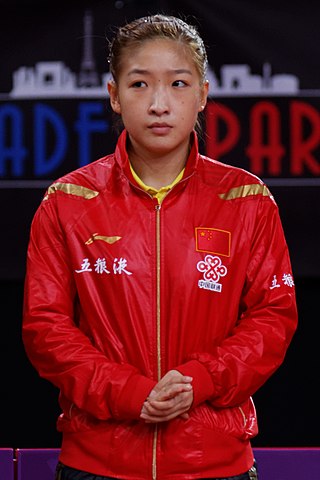
Liu Shiwen is a Chinese table tennis player. She is a five-time World Cup champion, one-time World Champion, three-time ITTF World Tour Grand Finals champion and four-time Asian Cup champion. She is known to be one of the fastest players in the world.
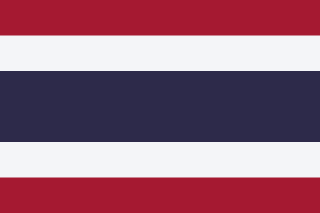
Thailand participated in the 2010 Asian Games in Guangzhou, China between 12–27 November 2010. The National Olympic Committee of Thailand sent 593 athletes to Guangzhou, and competed in 39 out of 42 sports. Thailand ended the games at 52 overall medals including 11 gold medals. These games witnessed first ever gold medals in Taekwondo.
Badminton at the 2010 Asian Games was held in Tianhe Gymnasium, Guangzhou, China from 13 November to 21 November 2010.
Boxing at the 2010 Asian Games was held in Lingnan Mingzhu Gymnasium, Foshan, China from November 16 to 26, 2010.
The Field hockey event at the 2010 Asian Games was held in Guangzhou, Guangdong, China from 13 November 2010 for Women and 15 November 2010 for Men. In this tournament, 10 teams played in the men's competition, and 7 teams participated in the women's competition. All matches were played at the Aoti Hockey Field.
Gymnastics at the 2010 Asian Games was held at the Asian Games Town Gymnasium in Guangzhou, China from November 13 to 26, 2010.
Judo at the 2010 Asian Games was held in Guangzhou, China between 13 and 16 November 2010. All competition held in the Huagong Gymnasium.
Shooting at the 2010 Asian Games was held in Aoti Shooting Range in Guangzhou, China between 13 November and 24 November 2010.
The Asian Gymnastic Union (AGU) organizes Asian Gymnastics Championships for each of the FIG gymnastic disciplines: men's and women's artistic gymnastics, rhythmic gymnastics, acrobatic gymnastics, aerobic gymnastics and trampoline gymnastics. This article lists only the senior editions of the Asian Gymnastics Championships, in which competitors must be over 16 years of age. Specific editions of the Asian Championships also exist for junior athletes; for example, the first edition of the Junior Asian Artistic Gymnastics Championships was held in 1971, but the first senior edition of the tournament was only held in 1996. Similarly, Junior Asian Trampoline Championships were held in 2010 and 2012, but only in 2014 the Asian Gymnastics Union held a senior tournament in conjunction with the junior championships for the first time.












